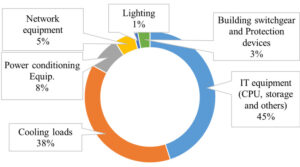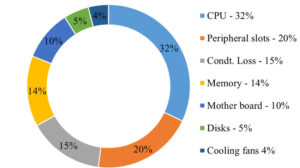In today’s digital age, data centers play a critical role in supporting the vast array of online services we rely on daily. However, with great power comes great energy consumption. Understanding and managing data center power usage is essential for operational efficiency and environmental sustainability.
Data Center Power Usage
Data centers are power-hungry entities that consume vast amounts of electricity to operate. From servers and cooling systems to auxiliary equipment, every component contributes to overall power consumption. Understanding the factors influencing power usage is the first step toward implementing effective energy-saving measures.
Major Factors Influencing Power Consumption
Numerous factors influence data center power consumption, including hardware efficiency, cooling systems, facility design, and power management practices. By examining these factors in detail, data center operators can identify areas for improvement and implement targeted strategies to reduce energy usage.
Effective Strategies to Reduce Power Usage
Optimizing data center power consumption requires a multifaceted approach. Implementing energy-efficient hardware, enhancing cooling systems, and adopting virtualization and consolidation techniques are just a few strategies that can significantly reduce power usage while maintaining optimal performance.
1. Innovative Cooling Solutions
Cooling systems account for a substantial portion of data center energy use. Traditional air-cooling methods are increasingly inadequate due to high-density servers and rising temperatures. We must turn to innovative cooling solutions to overcome these challenges.
-
Liquid Immersion Cooling: Revolutionizing Heat Management
Adaptive Cooling Systems: Intelligent Thermal Management
Liquid immersion cooling represents a paradigm shift, immersing hardware directly in a non-conductive liquid. This method not only enhances cooling efficiency but also extends hardware lifespan by reducing thermal stress. By eliminating the need for air conditioning and air handling units, liquid immersion cooling can slash cooling energy consumption by up to 95%.
Adaptive cooling systems use real-time data and AI algorithms to dynamically adjust cooling resources, optimizing energy usage while maintaining ideal operating temperatures. This smart approach to cooling ensures that no energy is wasted on overcooling, adapting to the varying demands of the data center environment.
2. Energy-Efficient Hardware: Redefining Performance
The selection of hardware plays a crucial role in the energy footprint of data centers. Advances in technology have introduced energy-efficient options that do not compromise performance.
High-Efficiency CPUs and GPUs
Solid-State Drives (SSDs): Enhancing Speed and Efficiency
The evolution of CPUs and GPUs has brought about models that offer improved performance per watt. These energy-efficient processors reduce the overall power consumption of data centers, contributing to a greener operation.
SSDs offer a dual advantage for data centers: lower power consumption and faster data access. By replacing traditional hard disk drives (HDDs) with SSDs, data centers can achieve significant energy savings while boosting performance.
3. Renewable Energy Integration
The transition to renewable energy sources is vital for reducing the carbon footprint of data centers. Solar and wind energy, coupled with battery storage systems, can provide a sustainable and cost-effective power supply. Implementing smart grid technologies further enhances the reliability and efficiency of renewable energy in data center operations.
4. Advanced Virtualization Techniques
Virtualization technology allows for the consolidation of multiple virtual servers onto a single physical server, significantly improving server utilization rates. This approach not only reduces the number of physical servers required but also decreases energy consumption for both operation and cooling.
5. Software Optimization: Maximizing Efficiency
The role of software in energy efficiency is often overlooked. Optimized software can substantially reduce the computational load on servers, leading to lower energy usage. Employing energy-efficient algorithms and streamlining code are key strategies for minimizing the energy footprint of data processing tasks.
P&C’s Role in Implementing Power-Efficient Solutions
As a leading provider of power and cooling solutions, P&C plays a crucial role in helping data centers optimize energy usage. From designing efficient power distribution systems to implementing advanced cooling technologies, P&C’s expertise ensures that data centers operate at peak efficiency while minimizing environmental impact.
Future Trends in Power Consumption and Sustainability
As technology continues to evolve, so too will data center power consumption trends. From renewable energy integration to advancements in energy-efficient hardware, the future of data center power consumption is bright. some anticipated future trends in this area:
- Energy-Efficient Hardware
- AI-powered Optimization
- Modular Construction
- Liquid Cooling and Immersion Cooling
- Real-time Monitoring and Control
- Software-defined infrastructure (SDI)
A Sustainable Future
The drive towards more energy-efficient data centers is not just about reducing costs or complying with regulations; it’s about ensuring the sustainability of our digital infrastructure in the face of growing environmental concerns. Data centers can significantly reduce their energy consumption and carbon footprint by adopting innovative cooling solutions, energy-efficient hardware, renewable energy sources, and advanced virtualization techniques, alongside optimizing software and implementing AI-driven energy monitoring.
Demystifying data center power consumption is essential for optimizing energy usage and reducing environmental impact. With P&C’s expertise and innovative solutions, the future of data center power consumption looks promising.



